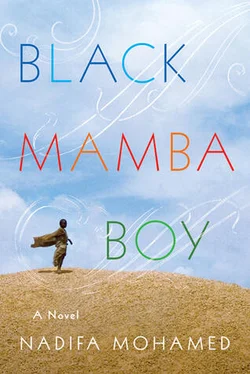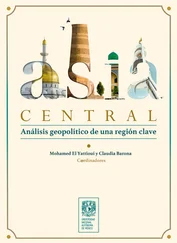Jama placed his feet in the large footprints the jinns had left behind. Left, right, left, right, he rode high on long thin legs. All around, large iridescent pools had formed from the night’s rainstorm, looking like mirages in the drifting heat of the day. Jama stopped regularly to marvel at the sudden deluge and examine his face in the water’s silky surface, he picked at tough karir berries and drank rainwater. The mountains had become pyramids of blue and dark purple under the rain clouds and it was with a joyful heart that Jama walked through the downpour, washing away the memory of months of grime, slaughterhouse blood, and misery. A caravan of wet camels, wooden bells clanking, sloshed past him, the young herders casting a quick suspicious look his way as they jumped over puddles. Jama followed the group discreetly, hiding behind the long legs of an old camel carrying a sick woman bundled up in hides. The caravan stopped at a saint’s tomb and began unloading, the women taking charge of the tents, the children watching the sheep while the men wrestled with the camels. In the mornings the camels would be called by name, and with a heave and a groan they would get up and amble over to their proud owners.
The rainy season had finally arrived; bash bash and barwaaqo, the season of splash splash and God’s rain. Everyone had a sparkle in their eye; necks craned toward the clouds for months could finally relax. For a few months life would be a little kinder and people would have the leisure to recite poems and fall in love. Green shoots sprouted at once and the camels ate as if they were at a wedding feast, glades appeared beside dusty flats that had magically become rivers.
The saint’s tomb was a simple structure with a large whitewashed dome but it brought together a cosmopolitan mix of travelers; rich men with high turbans and supercilious expressions prayed next to hardworking Yibirs, Tumals, and Midgaans. They came from every direction, picking their way through the muddy tracks left by earlier pilgrims, their figures barely distinguishable from the termite mounds and cacti. Ascetic nomads asked for blessings alongside boozy merchant sailors, home for the first time in years. Countrywomen with bare heads and exposed bosoms howled for fertility as did veiled, sheltered townswomen. Jama moved around in the melee, praying for a father while the women prayed for children. He observed the fervor of the other worshippers and hoped that God could still hear him through the clamor.
A little distance from the tomb was a hut surrounded by an inquisitive crowd. Jama pushed through and saw a nightmarish scene: an old man had a young boy’s head clamped between his knees; the holy man cut open the boy’s head; a flap of hairy skin fell to one side and he scored back and forth over the skull with his dagger; finally, a square of the boy’s skull came loose from the soft watery pulp of his brain; the old man carefully picked it out and placed it to his side. A woman explained to the silent audience that the boy had fallen off a mountain, had been asleep since and was not expected to wake up, and his father had brought him to the holy man in desperation. The boy lay lifeless throughout the operation, but his father was seated next to him, his eyes wide and white. Jama wished that he were the sleeping boy with his own father bent over in fear and love.
Jama spent the night at the tomb. Allah’s name was repeated until it echoed everywhere and seemed to emanate from the tomb, the trees, the mountains. From the nomads’ camp he could hear drumming and ululations long after dark, the young men and women dancing under skies that blazed magenta, jade, silver, violet with lightning. The air sizzled between downpours and the young warriors jumped up as high as fleas, throwing their spears in the air, showing off their martial acrobatics. Jama fell asleep with the stars dancing above his head, whirling dizzyingly to the drums and chants.
The next morning, a man ran around yelling for the people to rise and observe a miracle, the boy had awoken and was speaking again. Old and young crowded around the holy man’s hut and saw the light of the boy’s blinking eyes in the gloom. People shouted out, “Allahu Akbar, Allahu Akbar, God is Great,” and brought gifts of incense and dates to the man and his son. The holy man stood aloof from the spectacle; he calmly picked off the beads of his rosary and chewed a wad of qat. When an excited party of worshippers approached him, he waved them away and returned to the cool of the tomb. Jama saw the miracle as proof that of all the tombs in Somaliland, God’s attention was on this one. He raced away expecting his father to be delivered to him, and back on the road, within moments a lorry appeared, white with bismallah painted in red and yellow along its bumper, asking for the Lord to have mercy on it, and from its mirrors dangled withered jasmine chains whose scent still perfumed the morning air.
Jama chased after the lorry, waving and shouting. “Wait! Wait! Are you going to Sudan?”
The lorry slowed down with jeers from the cab. “Of course not. We’re going to Djibouti. If you wanna get in, just get in! Hurry up!” shouted one of the men sardined inside, the reflection of their bodies in the side mirror creating the impression of a hydra.
Jama climbed the ladder, throwing himself into a corner of what was essentially a large wooden crate containing goats, chickens, mangoes, onions, qat, and huddled men. There was a stirring as the child boarded; eyes peeped out and looked him up and down before falling back into sleep. The metal bars around the crate dug into Jama’s neck and stopped him sleeping, so he turned around and bade farewell to his homeland, a captured prince exiled along with goats and chickens. His land had been carved up among France, Italy, Britain, and Abyssinia. Somalis gathered beside wells to discover what was happening to their world, they learned about the machinations of the Ferengis the same way they had heard about Islam, only now the message wasn’t salvation but calamity. The coming tragedy was hinted at by the burning, mustard-scented winds blowing in from Abyssinia, the silence of the great League of Nations gossiped about by nomads in the desert.
The British had built the road to ease their passage into and out of their possession, and now Jama trundled along it, making slow progress toward the artificial border between Somaliland and Djibouti. The sun had fully reclaimed sovereignty over the sky and shone down on her subjects. The smell of grease, petrol, and rot drifted into Jama’s nose but he forced the bile back down his throat, willing this journey to come to an end.
DJIBOUTI TOWN, DJIBOUTI, SEPTEMBER 1936
No border or sign alerted Jama to the fact that he was in a new country, it was just a feeling of going under. The lorry moved along with its nose pointing down, down until it straightened out in a plateau of bewildering heat. Djibouti looked even more barren and fearsome than Somaliland, and the few trees that dared exist held up their arms in defeat. The earth was bleached white and the few comforts that the Somali desert shyly held out, blossoming cacti, large matronly bushes, lush candelabra euphorbia, were here maliciously denied. The air had a corruption to it, a mingled scent of sleaze, sweat, and goat droppings. Jama could hear people talking in a strange language over the din of road drilling. To his amazement they drove past a knot of reddened European men in tight little shorts, grown men in shorts so small that they nearly revealed what Allah had commanded be hidden. They stood, hands on hips, thick mustaches bristling under their boxy hats, ordering around a group of sweating Somali workers. Jama’s neck craned back to look at these men as the lorry sped past, certain that it was his first glimpse of the dangerous, womanly men of sin he had heard about in Aden. Jama’s hands gripped the planks of the crate as he watched the mysterious men retreat into the distance.
Читать дальше
Конец ознакомительного отрывка
Купить книгу












